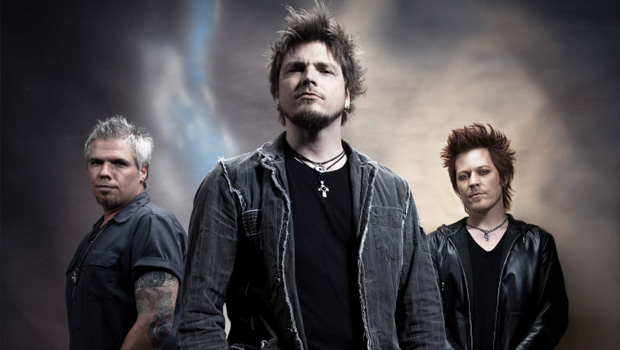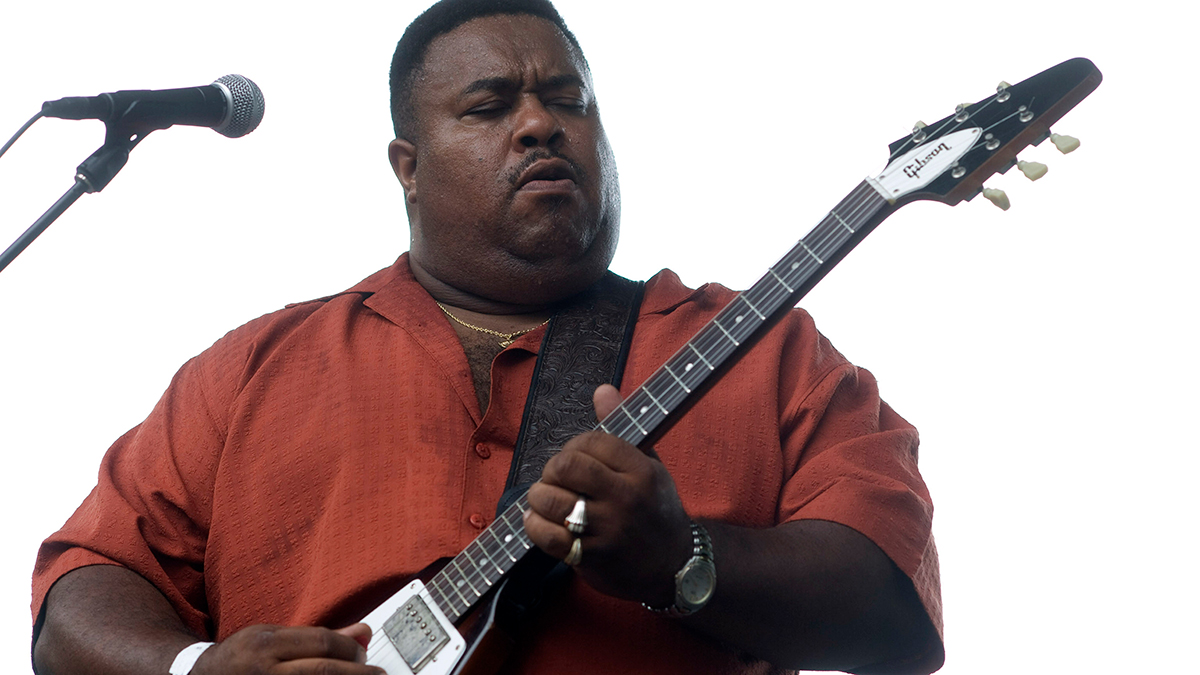
Crossfade have been away for a while. After being dropped from their label, the departure of their drummer, and singer/guitarist Ed Sloan going as far as to say at one point that "music is my enemy," the band have weathered the storm and come out the other side with a new album, We All Bleed, their first in five years.
If you're expecting heavy guitars with infectious hooks, We All Bleed won't disappoint, but don't expect the pop-rock fanfare of yesteryear. The chorus of the first song, with Sloan proclaiming, "I’m not holding onto dead memories," makes it crystal clear right away that the band have left the past behind and are forging a new sonic path. That's not to say old fans will be put-off by the band's maturing, but they should expect just that: a focused, mature album.
Crossfade recently stopped by the Guitar World offices to talk about their new album, their plethora of effect pedals and why you won't hear the name Loraine on We All Bleed.
GUITAR WORLD: You guys have been through a lot over the last five years: label changes, member changes, etc. What have these years been like for you guys, and how did that impact the mood of the record?
ED SLOAN: For me it was a shocker coming off of being on tour for three or four years and doing two albums. It took me quite a while to get back on my feet musically. Thanks to Les and Mitch, I got out of my haze and after that things just started flowing for the past two and a half to three years.
Les would probably say they didn't flow so well... [laughs]
LES HALL: It was a long two and a half years.
All the latest guitar news, interviews, lessons, reviews, deals and more, direct to your inbox!
How long have you guys been working on the songs for this new record?
MITCH JAMES: It was two and a half years of making it, and the record has been mixed for a year now.
You guys were dropped by Columbia after having your first album go platinum and your second album chart even higher. What's it like working with Eleven Seven after dealing with a major-label atmosphere?
MITCH: Well, it's a boutique label, so there's only a certain amount of people there. But the people they work with and for are their priority, so whatever they're doing, you know your name is being tossed around in conversations all the time.
It's not one guy sitting in a corner in charge of everything you do, depending on whether he likes you or he's busy thinking about his ex-wife ... But when you've got everyone in the label behind you and know that everyone's talking about it, it's a lot more refreshing to me knowing that things are going your way and they're going to do everything in their power to make sure it happens.
ED: The whole time we were writing the record, Alan Kovak was constantly keeping in contact with us and pursuing us ...
MITCH: And this is long before we got signed by them.
ED: Yeah, two and a half years before we got signed by them. His persistance really did lend a large hand in us deciding, "Yeah, this is the label we should go with."
Five years is a long time to be gone from the music industry these days. Do you have any expectations for the album?
MITCH: I don't think we have expectations as far as CD sales, but I think we do really expect people to wrap their heads around this album and view it as a whole and enjoy it, and know that it's such a huge step from the last two albums. Sonically, musically, lyrically ...
We certainly expect it to do well, whether or not that means sales in this day and age, but you know, people come to our shows and sing our songs, and that's what we consider successful.
Talk a little bit about the songwriting process behind the new album.
ED: I'd say a lot of it was me sleeping on a couch for about a year in the studio, and Les coming in every day and working his ass off for 16 hours kind of manically just putting out ideas and finally me catching on to that. He and I started to work together. We started to take a bunch of different ideas that he had, that I had, and starting putting them together.
Definitely not your typical "whole band gets together and jams out" type of thing, considering we had just lost our drummer. That was a big part of it.
What do you think, Les?
LES: I definitely agree. It was a lot of ideas starting off on piano and acoustic guitar, even though it's a heavy record. Staying up all night brainstorming, just tossing ideas back and forth and over-analyzing every single detail, which is part of why it took a long time to get going, but we made an amazing product at the end of the day.
Ed and Les, what were your guitar set-ups for the recording of We All Bleed?
LES: For the album we ran an Engl Powerball as our main amp. We ran that through a DI and then re-amped it through an old Marshall Plexi. Each amp was run through two 4x12 cabs with a 57 and a 421 on each one.
So there were eight microphones for one guitar, and then that was doubled with the exact same set-up, the exact same guitar. And that was a lot of the rhythm guitar sounds.
A lot of the solos were probably more Guitar Rig, some of those patches, and some old cheap POD stuff as well.
And guitar-wise?
LES: Guitar wise we used a '75 Black Beauty Les Paul, a '73 Gibson SG and then for the 7-string stuff we used Schecters.
ED: Les doesn't really understand those yet. [laughs]
LES: I personally hate 7-string guitars. I think they sound cool but I just don't like the way they feel. Once you get that 7th string in there, the scales are different and it just doesn't fit my hand as well.
Mitch, what about your bass sound on the album?
MITCH: The bass was an Ernie Ball Music Man run through an Ampeg SVT and miked with a 421 for the most part.
Did you guys record the album using ProTools?
MITCH: Sonar.
LES: We just had so many tracks and the machine we had Sonar on was able to run about 50 SSL plug-ins and Guitar Rig. There were over 100 tracks, and it still worked like a champ.
Talk about your live rig and how that differs from your studio set-up.
ED: With the live rig there's no Plexi, it's the Engl Powerball once again. Same guitars and a lot of pedals.
What's your pedalboard like?
[laughter]
LES: How much time ya got?
MITCH: It's probably about this wide. [holds arms out]
MARK CASTILLO: It looks kind of like the robot from Lost In Space...
[laughter]
ED: We had talked about putting little arms on the sides of it ...
LES: Anything that's a static pedal is run in the GCX and is put in the back in the rack. I've got a gate, a noise supressor, a chorus, compressor and a phase. There's a Line 6 rack and a G Major rack in the back as well, and then a purple Tremulator, I call it the "chopper," a Moogerfooger Ring Modulator...
ED: What'd you say?
LES: A Moogerfooger. [prounounced muggah-fugga]
[laughter]
LES: That's actually how you're supposed to say it, I think. So a Moogerfooger Ring Modulator, a Whammy pedal -- which I own four of but they keep breaking on me -- a volume pedal and a wah.
What sort of wah are you using?
LES: The [Morley] Mark Tremonti wah. And there are a few secret pedals too.
ED: Ah yeah, I forgot about "le secret."
LES: "Le Secret." yeah there's one of those in the back and one in the front.
You can't let the Guitar World readers in on this?
LES: I can't do it. I had to paint it silver so nobody could see what it is.
Ed, why don't you give us some of the stories behind the songs on the new record. "Dear Cocaine," for instance, is pretty much a letter to the drug. What inspired that?
ED: With "Dear Cocaine," Les came to Mitch and me with this piece of paper that said, "Dear cocaine, I'm not your bitch ..."
LES: "Dear cocaine, I'm not your whore anymore."
ED: And that kind of got all of us thinking about writing a letter to cocaine ...
MITCH: As a woman, or something in your life that's no longer necessary, that was just destructive. We actually thought about not having "cocaine" in the song for a long while, but couldn't really think of any girl's name that would be cool to sing. Loraine wasn't going to work ...
[laughter]
LES: I never thought about that.
ED: But that song is definitely a testament to friends and family.
Talk about the title track, "We All Bleed," and why that title was kind of representative of the feel of the album as a whole.
LES: I'll never tell the true story behind those lyrics, but the song is based on an experience I went through with a certain person, and the lyrics were basically saying "We all bleed, move on and get the fuck over it," you know?
So that's the meaning behind the song, but the story itself is kind of private.
How about "Prove You Wrong"?
ED: "Prove You Wrong" both lyrically and melodically was a song that I had written during my year hiatus. I was in a pretty bad state. I was just writing what I could write, and we had all gone our separate ways for a little while after getting off tour.
I played it for Les, probably right when I was hitting rock bottom, just kind of sick of everything, and Les said, "Come over to the studio, I got a present for you." And he had turned this pop song ...
LES: Cheesiest shit ever.
ED: [sings in upbeat, pop manner while band joins in on drums via the conference room table] "Somedays are worse than others / Somedays I can not feel a thing."
And he had taken my vocal track, cut it up and turned it into what it is now.
That was a moment were I actually broke down into tears and hugged the man, and that's when I kind of got out of my funk.
MITCH: Your first funk.
LES: For at least three days!
ED: I don't appreciate that! [laughs]
The new album from Crossfade, We All Bleed is out today, June 21 via Eleven Seven Music.
Josh Hart is a former web producer and staff writer for Guitar World and Guitar Aficionado magazines (2010–2012). He has since pursued writing fiction under various pseudonyms while exploring the technical underpinnings of journalism, now serving as a senior software engineer for The Seattle Times.

